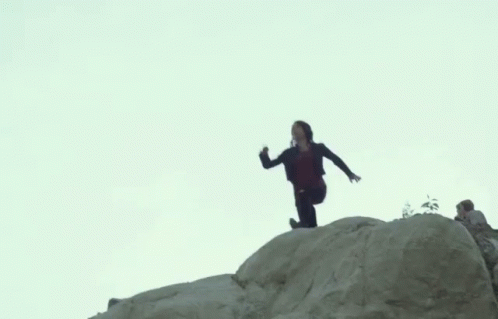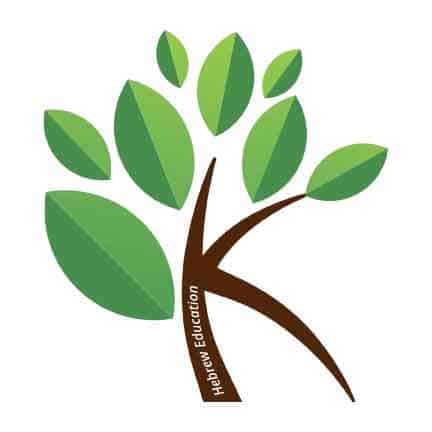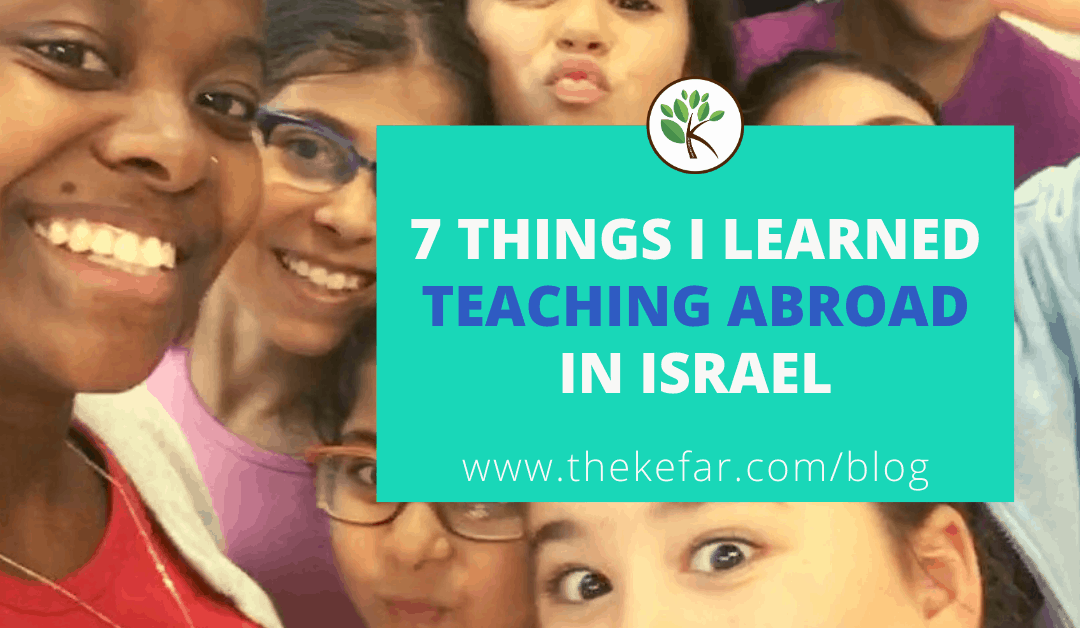In the Summer of 2016, I got an opportunity to teach English abroad in Israel with an organization called TALMA: The Israel Program for Excellence in English. I taught incoming 4th graders at an elementary school in Jerusalem, and while there were some really amazing moments, I remember this constant feeling of disappointment. I love teaching, and I had come with all these grand plans, only to spend more time managing behavior than teaching English. Fortunately for me, my co-teacher Linoy was an absolute pro, coming through at the most challenging moments, and fellow teachers Becca and Yaa kept me laughing and focused on the positives of each day. I ended the summer feeling like, eh, this was rough, but I’d do it again…and so I made plans to return the next year.

Several months later, however, TALMA launched its first-ever Full Year Teaching Fellows program, inviting previous summer participants to come back and teach abroad in Israel for a full school year. When I tell you I JUMPED at the chance to teach abroad in Israel, just know…

It took some convincing to get my husband on board with me leaving him for 11 months (he’s the real MVP), but ultimately he gave me his blessing, and I set off for the other side of the world. All I knew was that I’d be living in the southern city of Mitzpe Ramon, and teaching English – all the other details I would find out after arriving in Israel.
I ended up being placed at a religious elementary school in Dimona, where I taught grade 3 by myself, and grades 4-6 with a co-teacher. I taught 4 days a week (including Sunday, which is a work/school day in Israel, because 6 days shall you labor and all that jazz), and it was maddening, thrilling, challenging and rewarding all at the same time.

Outside of work, I mostly stayed home because that’s just how I am, but I also (in no particular order) took a class at Ben Gurion University in Beer Sheva; took an online Biblical Hebrew course; FINISHED MY MASTER’S DEGREE!!!; went to Cafe Shachor Chazaq and Kranium concerts; went on an ATV tour of the famous Makhtesh Ramon; saw Chris Rock perform live; attended my first Israeli wedding (which was magical), and of course, gave lots of private Hebrew lessons and did some curriculum design projects!
It was such an eventful and enriching year, marred only by the unexpected passing of my cousin Chris, and may his memory be a blessing. Overall, though, I’m so glad that I went, and I can’t believe it’s already been five months since I’ve been back – FIVE WHOLE MONTHS! I learned a lot while teaching abroad in Israel – here are 7 of the biggest lessons.
1. I’VE LEARNED THAT I CAN LIVE HAPPILY ANYWHERE.
I plan to live long-term outside of US, and spending a year in Mitzpe Ramon was just the sort of “test” that I needed to confirm that the expat life is indeed the life for me.
I have to admit that I was not the least bit excited about having to live in what I described to everyone as, “a dusty little town in the middle of nowhere.” In fact, when I sent in my location preferences for my first TALMA summer, Mitzpe was dead last on my list…as in, don’t send me there. I was over the city before I even got there, and when our bus finally pulled into Mitzpe, I was 100% expecting to see tumbleweeds blowing down the street.


But it was calm, it was quiet, and it was incredibly peaceful. There was just something relaxing about being in Mitzpe that I couldn’t (and still can’t) put my finger on. Maybe it was the nature of living in a small place, where neighbors invite you over for Shabbat dinner, where your shopping cart holds your place in line while you grab a couple of things you forgot, and where the corner store guy lets you pay for your things the day after.
That doesn’t mean that life was perfect. Living in Mitzpe also meant dealing with regular power outages, sometimes caused because I forgot I couldn’t have the stove and the kettle on at the same time. It meant remembering at least two hours in advance to turn on the water heater in winter if I expected a hot shower. It meant navigating a whole new health care system, which included learning that the only clinic in town closes from 2-4. It meant no all night transportation options, so being sure to catch that last bus or stay out all night. Yet with all of these inconveniences, I was happy. I was able to make do with what I had, rather than concern myself with what I didn’t, and it was confirmation that no matter where in the world I end up, I can and will live my best life.
2. I LEARNED TO DO MORE WITH LESS.
In the US, I was so used to getting everything I needed, either with a quick Walmart run or an Amazon Prime order. I had my own printer and laminator, and could create whatever I wanted, whenever I wanted, with no limitations. When I arrived at my Dimona elementary school, I realized the supply closet was really just a collection of dry erase markers closely guarded by the secretary. It was some time before my printer access was set up, with a limit of 300 copies for the entire school year. I don’t know what kind of miracles they were expecting me to work, but I did not work them. I eventually got around the limit (it’s good to make friends!), but it definitely made me conscious about how I used resources.
There were also plenty of times where I would get to school and find out the printer was broken, or the printer was working but there was no paper, or the internet was down and would be for several days. I created a lot of things by hand; used sheet protectors to create reusable worksheets; put the kids to work as much as possible (why print bingo sheets when they can make their own randomized versions in their notebooks?), and never planned a technology-based activity without a no-tech backup plan.

I had to adjust my mentality outside of the classroom too. In my first apartment, I had a king sized bed in a twin sized room; it gave a whole new meaning to the word “bedroom,” since the bed was just about the only thing that would fit in it. No problem though, I had two suitcases and a tiny night table – I just used each one as a dresser drawer 🤷🏾♀️. I only had a small toaster oven, so I just remolded foil pans to fit and cut all my recipes in half. It took forever and a day to bake using a 6-cup muffin tin, but whatever – there are worse things in the world. My second apartment was a started-from-the-bottom-now-we-here step up, but the experience of living “less comfortably” than I’m used to is one that I’m grateful for.
3. I LEARNED TO USE CHAOS TO MY ADVANTAGE.
Teaching in Israel can feel like riding a bike that’s on fire through fire while you’re on fire, aka this meme is accurate AF.

Israeli classrooms can be…let’s say, chaotic. Kids are literally bouncing off the walls, the teachers are going crazy, and I’m the English teacher from America trying to figure out what the hell is going on. I never did figure it out, but I learned how to exist in it, and how to make it work for me. When the kids were feeling restless, I gave them reasons to move around and channel the energy. When they felt competitive, I turned the lesson into a competition. When they were bouncing off the walls, I took the lesson outside. I loved having the freedom and support to do basically whatever I wanted with my classes, and incorporating students’ desires and feelings actually gave me more control.
4. I LEARNED TO BE MORE COMFORTABLE WITH PRAISE.
This was definitely a huge lesson for me, because I generally try not to be noticed. I don’t like attention, I don’t like when all the eyes in the room are on me, my responses to compliments are always painfully awkward and I just prefer to do what I do with as little fanfare as possible. I am a really great teacher though, and this attracts attention. On top of that, my classrooms tend to be on the loud side, so even if you don’t see me, chances are you hear the games, the competition, and whatever other activity is going on in the room. So although I don’t like attention, my classroom in Dimona definitely invited it. My principal told me I was the answer to his prayers; the math teacher told me I was a gift from Elohim; the security guard asked if she could sit in on my classes; and the homeroom teachers told me how if they had an English teacher like me when they were in school, they would have actually learned something.
While it’s still an awkward experience for me to accept praise, I’ve gotten more comfortable with it, and I’ve even gotten over my dreaded fear of someone saying to me, “so tell me about yourself.” (Seriously, it used to give me all the anxiety.) It’s a huge improvement for me to be able to talk more confidently about my skills and accomplishments without belittling or apologizing for them.

5. I LEARNED THE VALUE OF BUILDING NEW PERSONAL RELATIONSHIPS.
I have an amazing circle of friends who are more like sisters who I wouldn’t trade for the world. Whether we talk every day or every few weeks, they inspire and challenge me, make me laugh, give great advice, support and uplift me, and constantly remind me of how blessed I am to have them in my life. Since I have such solid friendships, I sometimes fall into that “no new friends” attitude, thinking that I don’t really need to expand my circle since I’m so fulfilled. I could not have been more wrong, and my experience teaching abroad in Israel proved it – the relationships I was able to build there did so much to make my year as fantastic as it was.
No one proved this more than Renaht, who I met through a friend of my husband’s who knew I was headed to Mitzpe, and called ahead to make the connection. Once I arrived and settled in, I reached out to Renaht because I have a thing against wrinkled clothing and was desperately searching for an iron; it would be tough to find one in Mitzpe, she told me, but I could have one of hers. I came over and was instantly adopted as family. When I needed an Israeli phone number to fill out medical forms and to open my bank account, she didn’t hesitate to let me use hers. She invited me over for Shabbat dinners and regular dinners, for specific reasons and for no reason. We talked, we laughed, I became honorary auntie to her three beautiful daughters, and through it all – she fed me. I can’t even begin to describe the deliciousness of the foods Renaht made for me. Did I mention she’s a chef and food scientist with degrees in culinary arts and biochemistry?! Despite running a vegan restaurant out of her home, managing all the responsibilities of being a wife and mother, AND being an accomplished singer and performer, she always opened her doors to me and provided whatever kind of help I needed.
She wasn’t the only one – there was my adopted Dodah Kokavah who also opened her home to me on multiple occasions, fed me amazing (and also vegan) meals, and allowed me to crash at her place when I was too sick to tolerate the hour-long death-defying ride back to Mitzpe. Hodaya became my work bestie, always there to answer questions, devour chocolate, use Hebrew phrases literally (and incorrectly) in English, and generally engage in fun and silliness. Ella, Maset, Merav, Erez, and Ruti shared their lives, opened up their homes, and really made us feel integrated. There was Than, Shad, and Ryan, whose apartment became my second home, and who were always willing to volunteer their kitchen for my cooking adventures. There was Elise, who made me laugh even without trying, and Stacey, full of good ideas and teaching tips. I can’t mention everyone who added to my experience teaching in Israel, but there were so many, and I am grateful for all of the relationships I was able to build, and connections that I continue to maintain.
6. I LEARNED TO SHARE MY GOALS WITH OTHERS.
My discomfort with talking about myself means that I usually don’t share my goals and dreams with others; I sort of just chug along and do my best to make things happen. While in Israel, our CEO, Alon Futterman, invited all the fellows to chat with him about life after TALMA. Instead of keeping my thoughts to myself, I took that chance to share my aspirations of doing more curriculum design work, and my commitment to Hebrew language education. That one conversation blossomed into a few opportunities, including being able to present at a major conference, being contracted to design an English language program from scratch for another organization, and a Hebrew language teaching position secured before I had even left Israel.
I may have eventually been able to accomplish one or two things on my own, but some opportunities I would not have even known about, had I not put myself out there. It was a great lesson to me to not be afraid to share my hopes and goals with others. Even if an idea isn’t fully fleshed out, even if I’m not all the way confident in a certain skill, even if the goal is less than realistic – tell somebody, then tell somebody else. As they say, closed mouths don’t get fed!

7. I LEARNED A TON OF HEBREW.
You probably saw this one coming, but I had to include it! One of the things that drew me to teach abroad with TALMA was the chance to be in Israel for a full year, to be able to speak Hebrew in all sorts of every day situations, and to expand my language abilities. Aside from the 45-minute once weekly formal lessons I got from ulpan, I learned by watching TV and shows on YouTube (go watch Taagad!!!), listening to Osim Shivuk and other podcasts, listening in on conversations at work, at the supermarket, and everywhere else. Above all, I took every chance I could to speak, and as the unofficial translator for the other fellows, I did a ton of talking. I’m also not shy about asking for the meaning of an unfamiliar word or phrase, inquiring about how to say something, or making a mistake. My Hebrew was great going into Israel, but I definitely walked away with an even greater command of the language.
All in all, teaching abroad for a full year was an experience I am grateful for. It pushed me out of my comfort zone, helped me to develop personally and professionally, and led to opportunities that previously were not even on my radar. Israel will always have a special place in my heart, and will always be a second home to me. If you’re thinking about teaching or even studying abroad – whether in Israel or another country – I highly recommend it. You learn so much about yourself when you’re thrust into a new environment, and have to live a life that’s different from what you’re used to. If you’re interested in the TALMA program specifically, feel free to reach out to me – I’d love to chat!
Until next time,
💙 T’helah


I saved this email because I knew that when I got the chance to read it, it would be a wonderful learning experience. Your documented experience(s) give me the motivation that I need in completing my educational goal (Dr. Lynn D. Cuyler) and recognize that I have more to share with others’ than I thought. OMG lady, you are truly blessed to have experienced life in this fashion. As I began reading your accomplishments, I realized that though I may not have the skills of teaching an alternative language, I do have the skills to teach others–which is something that I really want to do in life–teaching on a higher level than elementary. You have given light to something that has been my dream since I’ve started this doctoral journey. You are a true leader and the MH has blessed your dreams of success abundantly. Please, keep sharing these motivational documentations of your experiences. They are an inspiration. I need to look at the things I’ve learned in my life experiences in addition to sharing my dreams with others. I also often feel that when I share my dreams of success with others, they will be shot down or looked upon as bragging. This can be discouraging because this is not why I do it . So as you did, I keep them to myself until they come to fruition, then announce them. But I understand this is a hindrance in my life achievements. So tally-ho sistar. On a side note, I would like some suggestions on how/where/when I could start a business blog pertaining to Organizational Leadership. This is my course of expertise, but I am lacking blogging experience.
I pray that our relationship will stand strong for I look towards being a contributor to the life experiences of others. Love you and our connection/relationship. B’yafeeyah
Love this! <3